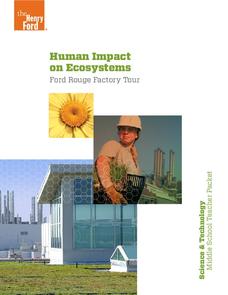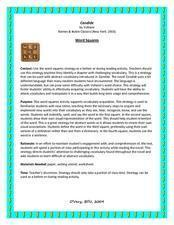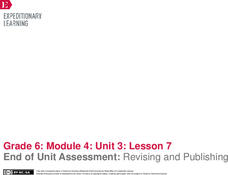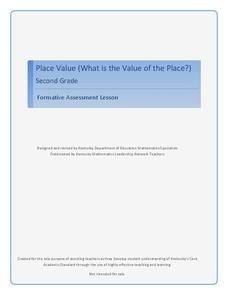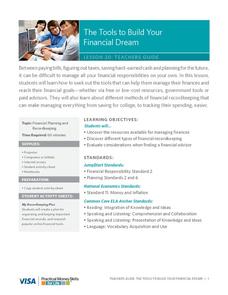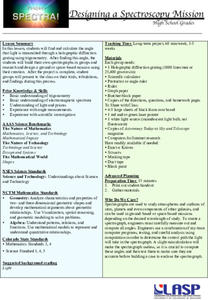Henry Ford Museum
Human Impact on Ecosystems
An environmenta science unit includes three lessons plus a cumulative project covering the ecosystem. Scholars follow the history of the Ford Rouge Factory from its construction on wetlands and how it destroyed the environment to its...
Curated OER
Candide: Word Squares
Readers of Voltaire’s satire create a word square for vocabulary drawn from Candide. The first box contains the word, the second a picture or illustration of the word. The definition is written in the third box, and learners write a...
EngageNY
End of Unit Assessment: Revising and Publishing
Dictionaries, thesauruses, word walls, oh my! Pupils use several resources to revise their position papers to include appropriate vocabulary. Then, after peer editing, scholars write the final drafts of their essays and self-assess using...
National Endowment for the Humanities
David Walker vs. John Day: Two Nineteenth-Century Free Black Men
What was the most beneficial policy for nineteenth-century African Americans: to stay in the United States and work for freedom, or to immigrate to a new place and build a society elsewhere? Your young historians will construct an...
CCEA
Home Economics: Teen Building
Learners explore the emotional and nutritional needs of teenagers in a six-lesson unit, which covers such topics as food sources, cooking skills, emotional well-being, and the positive effect of food and family occasions.
Skyscraper Museum
What is a Skyscraper?
Skyscrapers are amazing feats of architectural design that create the iconic skylines of the world's biggest cities. Young architects explore the defining characteristics of these monstrous towers with the first lesson in this four-part...
DiscoverE
Coding Without Computers
See what it feels like to be a robot. Scholars use programming vocabulary to program a human robot and test out their codes by acting them out. The code should result in stacking six cups into a pyramid.
Worksheet Web
Let it Snow
After reading an informational text detailing the ins and outs of snowflakes, scholars draw their own special design then work cooperatively to role play a snowman building scenario.
Curated OER
Place Value - What Is the Value of the Place?
Second graders build number sense in an activity that requires the matching of base 10 representations to numbers. It is the teachers responsibility to gauge student understanding and involvement while class members work in groups.
It's About Time
Monitoring Active Volcanoes
The fastest growing volcano in recorded history grew more than 150 meters in less than a week and to more than 424 meters in less than a decade. How do we safely monitor active volcanoes? Young scientists design an instrument to measure...
Teach Engineering
Earthquakes Living Lab: FAQs about P Waves, S Waves and More
Let's talk about earthquakes .... Using the Internet, pupils research what causes earthquakes, how scientists measure them, their locations, and their effects. The resource is not only informative, but it also builds crucial research...
Polar Trec
Nature's Density Column
Nature provides density columns in the polar regions that provides food for many animals. Young scientists build their own density columns with water in order to answer analysis questions. Through a slideshow presentation, scholars...
American Institute of Architects
Architecture: It's Elementary!—Fifth Grade
Young citizens construct an understanding of urban planning in this cross-curricular unit. Covering every aspect of city development from the political, economic, and social influences to sustainable building practices, this 10-lesson...
Brooklyn Children’s Museum
Volcanoes!
Give young geologists an up close and personal look at volcanoes with a series of hands-on earth science lessons. Whether they are investigating the properties of igneous rocks, building their own volcanoes, or making fudge to model the...
Consortium for Ocean Science Exploration and Engagement (COSEE)
Understanding the Food Web
Building on prior knowledge of the pervious lesson in the series, pupils explain the previous lesson to each other. Then they write a simple guide for a young child to read on the same topic.
EngageNY
Building Background Knowledge: Jigsaw to Build and Share Expertise about the 2010 Haiti Earthquake, Part 2
Calling all experts! Using the educational resource, pupils work together in small expert groups, reading an article about the 2010 Haiti earthquake. As they read, they record two main ideas and supporting details from the text.
Visa
The Tools to Build Your Financial Dream
When it comes to all the ways money management and financial responsibility weave into our daily lives as adults, make sure students are prepared to locate resources for managing their finances, such as a financial advisor.
EngageNY
Asking and Answering Questions: Reading about a Frog's Habitat
Building upon previous lessons, scholars take to asking and answering questions about a frog's habitat. A partner discussion follows a read-aloud of an informational text in preparation for a worksheet that boosts reading comprehension...
The Alamo
The Alamo - Remembering Through Education
Help young historians truly remember the Alamo with a comprehensive set of informational text about the Texas Revolution. Complete with important vocabulary, biographies of prominent historical figures, thorough timelines of events, and...
WindWise Education
How Does a Windmill Work?
Can my windmill pick up a weight? Given the same set of materials, groups design and build the most efficient windmill. On the first day, groups concentrate on getting a windmill to spin, while on the second day, they modify their...
NPR
Women Of Jamestown Lesson Plan
To better understand the role women played in early 17th century US history, class members examine the National Women's History Museum's online exhibit, Building the New World: the Women of Jamestown Settlement. After studying the 11...
LABScI
Kinematics: The Gravity Lab
Falling objects can be brutal if you don't protect your noodle! Scholars explore the motion of falling objects through measuring short intervals to determine if the distance traveled varies with time. Building off of this, scholars...
Purdue University
Lifeguard Chair
Save the class from a lack of engineering experience. An engaging STEM activity has learners work in groups to design a lifeguard chair out of masking tape and index cards. They build and test prototypes, all while learning about the...
University of Colorado
Designing a Spectroscopy Mission
Design a mission over the rainbow. Small groups spend several weeks together determining a mission related to spectroscopy. The teams build spectrographs and analyze the design to determine whether it will carry out the mission. At the...
Other popular searches
- Vocabulary Building
- Esl Vocabulary Building
- Synonyms Vocabulary Building
- English Vocabulary Building
- Vocabulary Building Games
- Vocabulary Building Spanish
- Vocabulary Building Lessons
- Vocabulary Building Winter
- Weather Vocabulary Building
- E Sl Vocabulary Building
- Building Vocabulary Skills
- E Sal Vocabulary Building


